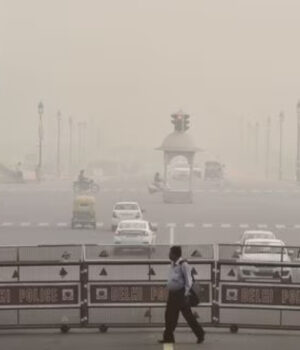Recently, the overall Air Quality Index (AQI) in the national capital plummeted to the ‘very poor’ category, underscoring the severity of the issue and the urgency for remedial action.
Delhi, known for its ever-growing population and myriad sources of pollution, has been grappling with air quality problems for quite some time. Despite the government’s concerted efforts to combat the issue, the problem persists. The reasons behind this concerning trend are multifaceted, encompassing a range of factors that need to be addressed comprehensively.
One of the chief contributors to the declining air quality in these metropolitan areas is vehicular emissions. Both Delhi and Mumbai have an exceptionally high density of vehicles on their roads, resulting in a constant release of pollutants into the atmosphere. These emissions, comprising a toxic cocktail of particulate matter, carbon monoxide, and volatile organic compounds, have been consistently pushing AQI levels to hazardous levels, particularly during the winter months when weather conditions exacerbate the problem.
Industrial activities also play a substantial role in this conundrum. As economic hubs, both cities host numerous industries that release pollutants into the air, further worsening the air quality. Inefficient or outdated industrial practices and inadequate regulation have allowed these emissions to go unchecked.
Another noteworthy factor is construction dust, which is particularly prevalent in Delhi due to ongoing infrastructure projects. This fine particulate matter gets suspended in the air, adding to the overall pollution load. The construction industry’s contribution to poor air quality is often underestimated, but it requires stricter oversight and implementation of dust control measures.
Agricultural practices, especially the practice of crop stubble burning in the neighboring states of Haryana and Punjab, add to the seasonal smog and pollution that blankets the region. This annual phenomenon, often referred to as the “Delhi smog,” drastically deteriorates air quality, making it hazardous to breathe. Addressing this issue necessitates a coordinated effort involving multiple states and central authorities.
Meteorological factors also have a significant impact on air quality in these cities. The onset of winter brings with it temperature inversions, which trap pollutants close to the ground, exacerbating the problem. Inadequate wind and atmospheric dispersion can prolong periods of poor air quality.
Government initiatives and policies have sought to mitigate the issue. Measures such as the Odd-Even scheme, which restricts vehicular movement based on license plate numbers, have been implemented in Delhi to reduce congestion and emissions. Mumbai, on the other hand, has focused on improving public transportation options. Despite these efforts, more aggressive and long-term solutions are needed.
Transitioning to cleaner energy sources, encouraging the use of public transport, promoting green spaces, and fostering sustainable industrial practices are essential steps toward improving air quality in both cities. Additionally, enforcing stringent regulations and penalties for polluters is imperative to combat this pressing issue.
Public awareness and active participation are equally critical. Residents must be educated about the adverse effects of poor air quality on their health and well-being. Individual actions, such as reducing personal vehicle use and adopting cleaner energy options, can collectively make a significant difference.
The escalating air quality crisis in Delhi and Mumbai is a matter of utmost concern. It calls for a holistic approach, combining government action, public participation, and international collaboration, as air pollution is not limited by city boundaries. A concerted effort is needed to ensure that the air becomes breathable once again and the health of millions of people living in these cities is safeguarded.










